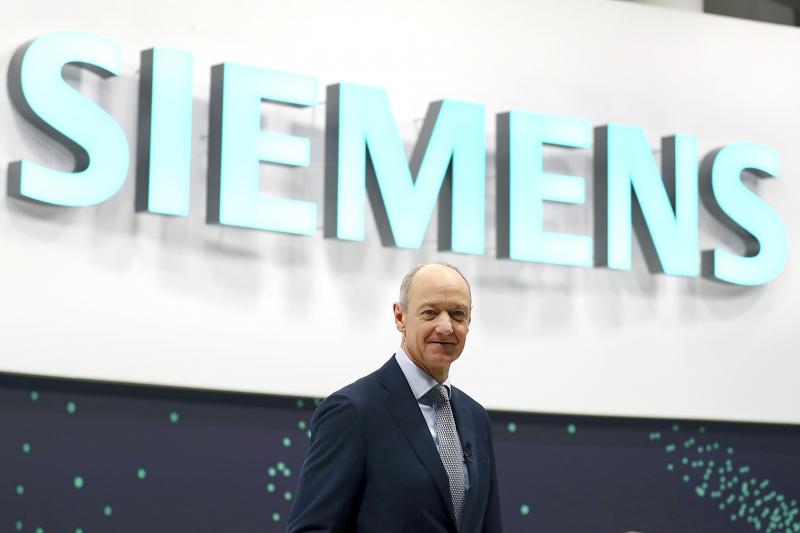Siemens AG raised its annual guidance after better-than-expected sales and profit in its first quarter to Dec. 31 last year, the latest sign Europe’s biggest engineering company is benefiting from a strong rebound in China.
Siemens now sees full-year net income rising to as much as 5.5 billion euros (US$6.6 billion) from 4.2 billion euros last year, clearly above previous expectations for moderate growth, it said yesterday.
That is after comparable revenue increased in all four of its industrial businesses, including at its high-margin software segment.

Photo: AP
“Some of the industries we lead have recovered clearly faster than expected,” co-chief executive officer Roland Busch said. “China stood out clearly here: The Chinese economy has recovered from the downturn, and its gross domestic product is now higher than it was before the [COVID-19] pandemic.”
The raised outlook is a boon to long-time boss Joe Kaeser, who was to hand over the reigns of the German conglomerate to Busch later yesterday.
During his seven-year run, Kaeser streamlined Siemens’s sprawling conglomerate structure to help it focus on high-margin businesses, such as its factory-automation software.
Demand from China, which has roared back to pre-pandemic growth rates, has given key support to global trade and to some of Germany’s biggest exporters, including automakers Volkswagen AG and BMW AG.
Still, Siemens cautioned that it continues to expect a “complex” macroeconomic environment because of the pandemic and said its outlook is based on economies continuing to recover.
“It’s very uncertain what the global development will do in terms of both supply chain as well as, of course, on the demand side,” Kaeser said in an interview on Bloomberg TV.
“That’s why it’s so important that we get the vaccine rolled out to everybody,” he said.
Group sales rose 7 percent on a comparable basis in the first quarter, with operating profit at its industrial business jumping 39 percent.
In China, Siemens won orders to help BMW increase manufacturing capacity and digitize the factories of a local glassmaker.
In Egypt, the company signed a memorandum of understanding to build the country’s first high-speed rail system.
Siemens has weathered the pandemic better than some of its automotive and industrial clients partly because it was able to keep its factories running virtually uninterrupted.
It has also had an easier ride than US rival General Electric Co, which is reliant on aviation customers hit by a collapse in air travel.

MULTIFACETED: A task force has analyzed possible scenarios and created responses to assist domestic industries in dealing with US tariffs, the economics minister said The Executive Yuan is tomorrow to announce countermeasures to US President Donald Trump’s planned reciprocal tariffs, although the details of the plan would not be made public until Monday next week, Minister of Economic Affairs J.W. Kuo (郭智輝) said yesterday. The Cabinet established an economic and trade task force in November last year to deal with US trade and tariff related issues, Kuo told reporters outside the legislature in Taipei. The task force has been analyzing and evaluating all kinds of scenarios to identify suitable responses and determine how best to assist domestic industries in managing the effects of Trump’s tariffs, he

TIGHT-LIPPED: UMC said it had no merger plans at the moment, after Nikkei Asia reported that the firm and GlobalFoundries were considering restarting merger talks United Microelectronics Corp (UMC, 聯電), the world’s No. 4 contract chipmaker, yesterday launched a new US$5 billion 12-inch chip factory in Singapore as part of its latest effort to diversify its manufacturing footprint amid growing geopolitical risks. The new factory, adjacent to UMC’s existing Singapore fab in the Pasir Res Wafer Fab Park, is scheduled to enter volume production next year, utilizing mature 22-nanometer and 28-nanometer process technologies, UMC said in a statement. The company plans to invest US$5 billion during the first phase of the new fab, which would have an installed capacity of 30,000 12-inch wafers per month, it said. The

Taiwan’s official purchasing managers’ index (PMI) last month rose 0.2 percentage points to 54.2, in a second consecutive month of expansion, thanks to front-loading demand intended to avoid potential US tariff hikes, the Chung-Hua Institution for Economic Research (CIER, 中華經濟研究院) said yesterday. While short-term demand appeared robust, uncertainties rose due to US President Donald Trump’s unpredictable trade policy, CIER president Lien Hsien-ming (連賢明) told a news conference in Taipei. Taiwan’s economy this year would be characterized by high-level fluctuations and the volatility would be wilder than most expect, Lien said Demand for electronics, particularly semiconductors, continues to benefit from US technology giants’ effort

‘SWASTICAR’: Tesla CEO Elon Musk’s close association with Donald Trump has prompted opponents to brand him a ‘Nazi’ and resulted in a dramatic drop in sales Demonstrators descended on Tesla Inc dealerships across the US, and in Europe and Canada on Saturday to protest company chief Elon Musk, who has amassed extraordinary power as a top adviser to US President Donald Trump. Waving signs with messages such as “Musk is stealing our money” and “Reclaim our country,” the protests largely took place peacefully following fiery episodes of vandalism on Tesla vehicles, dealerships and other facilities in recent weeks that US officials have denounced as terrorism. Hundreds rallied on Saturday outside the Tesla dealership in Manhattan. Some blasted Musk, the world’s richest man, while others demanded the shuttering of his